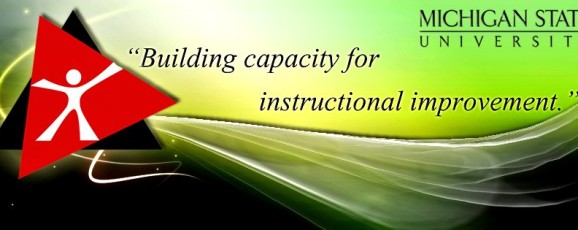Michigan Fellowship of Instructional Leaders – October
Today our Instructional Leadership Team met in Lansing for an all day conference to continue focusing on improving instruction in our building. Our school is in the fourth and final year of the Michigan Fellowship of Instructional Leaders Institute and the focus now is on creating self-sustaining instructional teams to continue the work we have been doing over the years in this program. Everything we do focuses around the Leadership for Coherence Framework that brings cohesiveness around the instructional core – always looking at the connection between the core: the students, the teachers, and the content. Our work follows the findings from the 5th Annual Conference of the Achievement Gap Initiative from Harvard University which looks at the five steps to becoming an exemplary high school: 1) accepting responsibility to lead the change process 2) having a mission statement that focuses on a few key ideas and priorities 3) designing strategies, plans, capacity and incentives for inclusive, high quality adult learning 4) developing and refining quality standards for judging teacher and student work and 5) skillfully and relentlessly implementing plans, monitoring quality and providing appropriate supports and incentives. The main take-away of this research was that “student achievement rose when leadership teams focus thoughtfully and relentlessly on improving the quality of instruction.”
Learn about this Harvard Achievement Gap Initiative here: http://www.agi.harvard.edu/
During the day, we discussed and made our “Instructional Leadership Team Goals” for the year. We had three goal areas. One was in team development where we focused on how to become a higher functioning team and how to continue to learn and grow as instructional leaders. The second was in strategic resource usage where we looked at ways to maximize the instructional impact of the time that teachers have to collaborate and ensure that out scarce resources focused on only a small set of the most promising improvement initiatives. And third, clarifying expectations. With this goal, we looked at ways to deepen common instructional expectations for teachers and students building-wide. This day allowed us to reflect on our next steps and to make some realistic goals for the rest of the school year. We delve deeper into each of these goals by looking at what we have done already and how effective it has been. For example, we listed all our school initiatives and then rated its relevance to the core, the clarity of expectations to the staff, the clarity of next steps to the staff, perceived collegial response to the initiative, and the connection to our school improvement plan. We also looked at the amount of time we allotted to each initiative in our professional development. This allowed us to have some great insights and to focus our work and goals. At the end of the year, we will be reflecting on outcomes we achieved and sharing this will other schools in a presentation. This accountability is an important component as well as constant reflection and redefining of our goals while reviewing data.
These days in Lansing have always been productive times to focus on instructional improvement to increase student achievement and it is great to be part of a committed group of educators up on a Saturday morning and working through the day to find ways to help our teachers be more successful and in turn our students achievement increase.
THE MODULES
Another exciting initiative the MiFIL team at MSU has been working on over the summer is online training modules. During our summer institute, several of us were asked to be interviewed to share what we have learned in this program and how it works in our schools. I was one of several interviewed. It was exciting talking about all the great things we have done as a result of our learning at MiFIL. So today they showed us a sample module they had completed, and my interview was shown about Instructional Rounds. These modules will be used to help train new members to the MiFIL team. It is a great concept that will definitely benefit schools that want to focus on how to improve instruction to improve student achievement. It was great to be a part of this process!
A couple clips from the module can be found here:
http://bblog3.bobbijokenyon.com/portfolioentry/instructional-rounds-mifl-module/
http://bblog3.bobbijokenyon.com/portfolioentry/protocols-mifl-module/

The Michigan Fellowship of Instructional Leaders is designed to support instructional leaders as they develop the skills necessary to systematically improve the quality of instruction in their buildings by exercising visionary, instructional and operational/systems leadership, and cross-cutting leadership skills related to data collection and analysis, communication and managing change.






Bee October 20, 2012 Blog